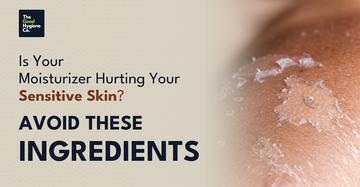If your moisturiser that is meant to hydrate and soothe is leaving your skin stinging, red, or irritated, you're not alone. Many people with sensitive skin unknowingly use products that make their condition worse. The culprit often lies in the very ingredients hiding in your skincare routine. In this guide, we’ll help you understand what to avoid, how to read labels, and how to choose the best moisturiser for sensitive skin , so your skincare can truly care for your skin.
Understanding Sensitive Skin: What Makes It React?
Sensitive skin isn’t a medical diagnosis but rather a condition where your skin reacts more easily to triggers. These may include:
- Harsh weather
- Hot water
- Certain fabrics
- Friction
- Chemical-laden skincare products
If you often experience redness, burning, stinging, tightness, or dry patches, your skin may be classified as sensitive. Choosing the right skincare for sensitive skin begins with eliminating irritants especially in products you use every day, like moisturisers.
Why Your Moisturiser May Be Causing Damage
Moisturisers are supposed to protect your skin’s natural barrier and restore hydration. But for sensitive skin, a wrong moisturiser can do the opposite. Instead of repairing the skin, it can strip away protective oils or introduce allergens, causing inflammation and breakouts.
That’s why you must avoid products that are not specifically formulated as a moisturiser for sensitive skin —and especially avoid the following harmful ingredients.
7 Common Moisturiser Ingredients That Can Irritate Sensitive Skin
1. Fragrances (Synthetic or Natural)
You might love that floral or citrusy scent, but fragrances are one of the top causes of allergic reactions in skincare . Even "natural" fragrances like essential oils can trigger redness or burning.(1)
What to do: Look for moisturisers labeled “fragrance-free” (not just “unscented”) and always patch test new products.
2. Alcohols (Like Denatured Alcohol or SD Alcohol)
Certain alcohols are added to give moisturisers a lightweight feel or to help ingredients penetrate better but they can also be extremely drying and irritating.
Avoid: Alcohol Denat, SD Alcohol 40, Ethanol
Safer Alternatives: Fatty alcohols like Cetearyl alcohol, which are actually good for your skin barrier.
3. Essential Oils and Botanical Extracts
While these are touted as “natural,” essential oils like lavender, peppermint, tea tree, and citrus can cause contact dermatitis or photosensitivity, especially in sensitive skin types.
Common Irritants: Eucalyptus oil, lemon extract, rosemary oil, ylang-ylang
Tip: If you want a natural moisturiser for sensitive skin, ensure it is clinically tested and doesn’t contain sensitising botanicals.
4. Harsh Preservatives (Parabens, Formaldehyde Releasers)
Preservatives are needed to prevent bacteria, but some are known skin irritants. Formaldehyde-releasing preservatives can slowly release formaldehyde a known allergen and potential carcinogen.(2)
Avoid:
- Parabens (methylparaben, propylparaben)
- DMDM Hydantoin
- Imidazolidinyl Urea
- Quaternium-15
Better choice: Products with gentle, low-irritation preservatives like phenoxyethanol in minimal concentrations or cosmos approved preservatives.
5. Sodium Lauryl Sulfate (SLS)
SLS is a surfactant used for cleansing and foaming. While less common in moisturisers, it may be present in 2-in-1 products or hydrating cleansers. For sensitive skin, SLS disrupts the moisture barrier and causes tightness and irritation.
Choose instead: Sodium cocoyl isethionate, a milder cleansing agent.(3)
6. Retinoids or Strong Exfoliating Acids
Retinol, AHAs (glycolic acid, lactic acid), and BHAs (salicylic acid) are powerful skin-renewing ingredients—but in their synthetic or high-concentration forms, they can be too harsh for sensitive skin when used in moisturisers.
Watch out for:
- Retinol or retinoic acid
- Glycolic acid
- Lactic acid in high concentrations
Better Options:
For sensitive skin, choose plant-based retinoid alternatives (like bakuchiol) that deliver similar benefits without irritation, or plant-derived AHAs in gentle formulations. Another excellent choice is niacinamide or polyhydroxy acids (PHAs), which provide mild exfoliation and hydration with far less risk of sensitivity.
7. Dyes and Colorants
Artificial colors are added for aesthetic appeal but offer no skincare benefit and often trigger irritation or allergies.
Clue: If your moisturiser is pink, blue, or green, it may contain harmful dyes. Look for transparent or white creams labeled “dye-free.”
How to Choose the Best Moisturiser for Sensitive Skin
When shopping for the best moisturiser for sensitive skin , consider the following checklist:
✔ Fragrance-free and alcohol-free
✔ Dermatologist-tested
✔ Hypoallergenic and non-comedogenic
✔ pH balanced
✔ Formulated for sensitive or reactive skin.
Recommended Ingredients That Work Gently for Sensitive Skin
Look for these skin-soothing ingredients(4) in your next moisturiser:
- Ceramides – Help restore and strengthen the skin’s barrier
- Niacinamide (Vitamin B3) – Reduces redness, improves elasticity, and calms irritation
- Glycerin – A humectant that draws moisture into the skin
- Hyaluronic Acid (Low Molecular Weight) – Deeply hydrates without clogging pores
- Colloidal Oatmeal – Soothes inflammation and itching
- Aloe Vera (Stabilised) – Cools and hydrates skin naturally
- Allantoin – Gentle exfoliator and calming agent
TGHC's Commitment to Sensitive Skin
At The Good Hygiene Company , we believe skincare should nurture, not harm . That’s why all our formulations are:
- Free from over 1,000 potentially irritating chemicals
- Formulated for skin that’s allergic to even the safest ingredients
- Dermatologist-formulated and patch-tested
- Suitable for both women and men with sensitive skin
Tips to Use Moisturisers Correctly on Sensitive Skin
Even the best moisturiser can irritate if misused. Here are some tips:
- Always patch test new products on your inner forearm
- Apply moisturiser on slightly damp skin after cleansing
- Use gentle, upward strokes ; no rubbing or tugging.
- Layer with SPF during the day for extra protection.
- Keep your routine minimal—less is more with sensitive skin
When to See a Dermatologist
If your skin remains inflamed, itchy, or flaky despite using gentle products, consult a dermatologist. You may have an underlying condition like:
- Eczema
- Rosacea
- Contact dermatitis
- Seborrheic dermatitis
A professional diagnosis can help you manage your skin better and avoid unnecessary trial and error.
Conclusion
Your skin is not supposed to hurt. If your moisturiser is causing burning, redness, or discomfort, it’s time to make a change. Understanding which ingredients to avoid and which ones your skin loves can completely transform your experience with skincare.
Choose a moisturiser for sensitive skin that puts your skin first free from harsh chemicals, loaded with calming ingredients, and created with care. At TGHC, we make sure every drop of hydration supports and strengthens your skin barrier, not weakens it.
Your sensitive skin deserves more than a band-aid. It deserves a solution that heals.
References:
1. Art of Prevention: Essential Oils - Natural Products Not Necessarily Safe - 2020 Nov- https://pmc.ncbi.nlm.nih.gov/articles/PMC8243157/#:~:text=Allergic%20contact%20dermatitis%20to%20essential%20oils&text=Individuals%20at%20increased%20risk%20of,disease%20despite%20typical%20treatment%20methods.
2. Formaldehyde Exposure and Its Potential Health Risk in Some Beauty Salons in Kumasi Metropolis - 2020 Nov - https://pmc.ncbi.nlm.nih.gov/articles/PMC7661109/
3. Why is sodium cocoyl isethionate (SCI) mild to the skin barrier? - An in vitro investigation based on the relative sizes of the SCI micelles and the skin aqueous pores - 2007 May - https://pubmed.ncbi.nlm.nih.gov/17598025/
4. Sensitive skin: Active ingredients on the spotlight - 2022 Feb - https://pubmed.ncbi.nlm.nih.gov/34813665/






